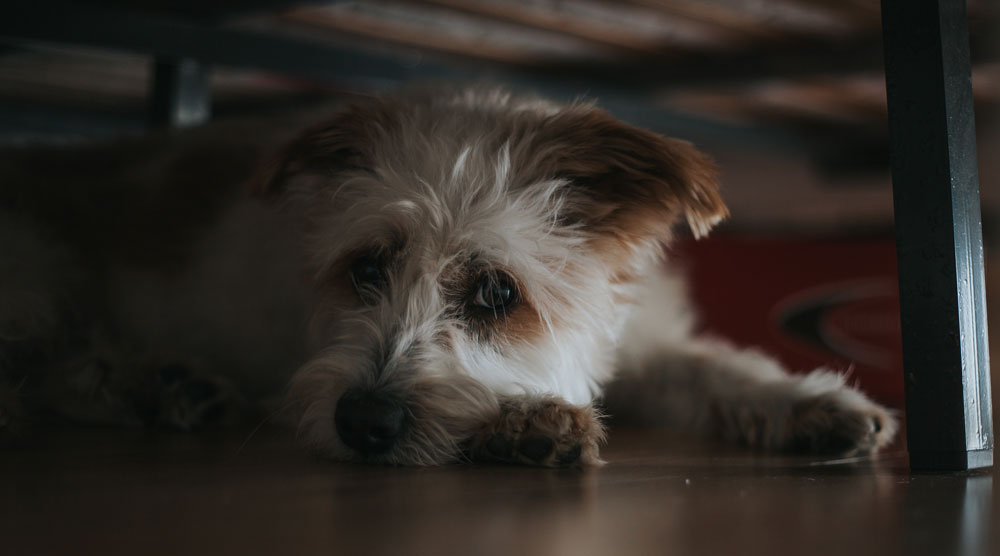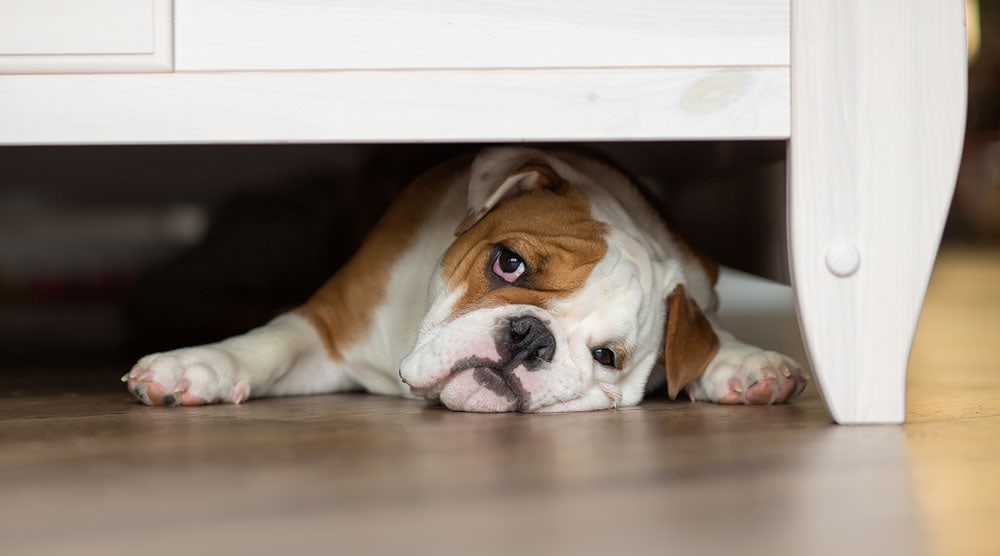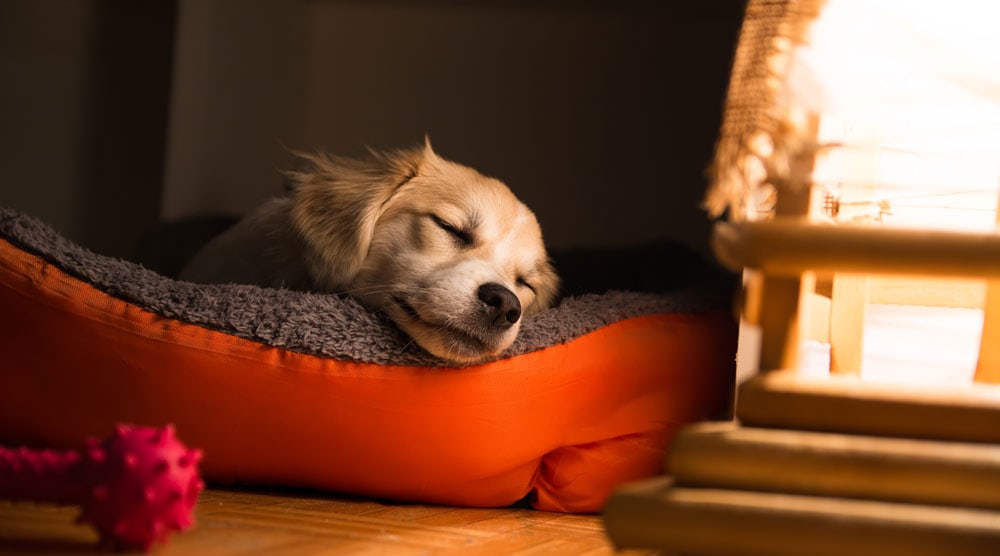Does your dog often sleep under your bed? Keep reading to discover what this behaviour means – and why it’s usually nothing to worry about.
Contents
In this article, we’ll discuss why some dogs sleep under a bed, why this behaviour is usually harmless, and the situations when it might indicate a problem.
5 Reasons Why Dogs Sleep Under a Bed
There are many reasons why a dog might sleep under a bed. But before we get to these reasons, we must understand the difference between sleeping and hiding.
Sleeping under a bed is usually nothing to be concerned about. As we’ll discuss, dogs often enjoy sleeping under a bed because it’s quiet, cool, and comfortable.
However, a dog that remains alert under a bed might be hiding rather than resting. In this situation, you should try to identify what’s causing your dog to feel anxious or stressed.
Now, let’s look at why a dog might choose to sleep under a bed.
1. They Enjoy Sleeping in a Safe Space
Dogs are domesticated animals, but they still retain some instincts of wild animals. One of these is the need for a safe and secure place to rest.
Under a bed can be the perfect den for a dog, as it’s a permanent item of furniture that keeps them fully covered while sleeping. This provides a sense of safety that the dog might not get from a regular pet bed.
A bonus is that the bedroom has the scent of the dog’s owner, which helps them relax and feel safe. This is also why dogs may snuggle their nose under a blanket when sleeping.
Tip: If your dog loves to sleep in a den, you might consider getting them an enclosed dog bed.
2. They Want Some Alone Time in a Quiet Spot
Dogs need much more sleep than many people realise! If your pet feels he can’t relax on his regular bed, he may try resting in alternative locations.
While the amount of sleep time varies depending on the dog’s breed, age, and other factors, the underlying message is that dogs need a lot of rest. Here’s a quick overview depending on age:
- Puppies. Puppies need to sleep longer than adult dogs. While there isn’t a specific amount they need to sleep, many people believe that they need around 18 hours of sleep per day.
- Adult Dogs. Adult dogs typically sleep around 12-14 hours daily, although larger breeds tend to sleep longer.
- Senior Dogs. As you would expect, senior dogs need more sleep than adult dogs and are more likely to have frequent naps during the day.
If you have a busy household or your dog is often disturbed, then they may seek out a quiet location to sleep.
As bedrooms are often less busy during the day than other rooms, sleeping under the bed can make it much less likely that your pet’s nap is interrupted.
Tip: Make sure everyone in the household knows not to disturb or startle your dog when he’s resting. Children must also understand that the dog must be left alone during sleep.
3. They Want a Cool and Comfortable Sleeping Location
Dogs, just like humans, find it difficult to sleep when it’s hot – especially if they have a thick coat. That’s why many dogs seek out cool locations to lay down, such as hard floors or near a fan.
The space under a bed is often one of the coolest places in a house on a warm day. So, your pet may sleep there to benefit from the more comfortable temperature.
If you have a soft, thick carpet in the bedroom, then sleeping under the bed becomes even more attractive for your pet.
4. They Are Hiding a High-Value Item
Dogs sometimes hide high-value items where people aren’t likely to go. These items could include toys, food, or other objects around the house.
Once a dog has stored the item, they may want to sleep next to it.
Under the bed is a perfect location for stashing something the dog doesn’t want others to find. It’s dark, covered, and humans rarely go there.
If you notice that your dog is hiding high-value items under the bed, then it’s important to be wary about trying to take it away. Dogs are more likely to show resource guarding behaviour when they are hiding an item in a den because:
- They feel trapped and unable to escape.
- The den itself has become valuable.
For this reason, never grab the item from under the bed. Instead, use another high-value item to lure out the dog, then find the item once the dog isn’t nearby.
Tip: It’s important to understand that dogs don’t hide high-value items because they feel guilty or “know” they shouldn’t have the object. They do it as an instinct to protect something that seems valuable.
5. They Want to Sleep Near You
Does your dog only sleep under the bed at night? If so, then they may just want to be near you while they rest!
Dogs often feel most relaxed and happy when they are with their owners – but not all dogs like to sleep in a human bed. So, it makes sense that many dogs sleep best when their loved ones are nearby.

Hiding Due to Anxiety, Illness, or Stress
The reasons above can often explain why a dog sleeps under a bed, but they aren’t the whole story.
If your dog is hiding under the bed, rather than sleeping, then they could be seeking a safe space. This behaviour could be caused by:
- Anxiety, Stress, or Fear. Dogs seek a safe den when they are scared or anxious. Common triggers include fireworks, thunder, and new guests. Chronic stress can also cause a dog to hide.
- Illness or Injury. If your dog suddenly starts hiding under a bed (or anywhere else), this could signify illness or injury. Dogs instinctively hide when they feel vulnerable.
It’s important to know the typical body language signals of stress, so you can identify when your dog is unhappy. Aside from hiding, symptoms include barking, pacing, yawning, panting, and a tucked tail. Read our guide to canine stress to learn more.
You should also look out for symptoms of a potential illness or injury. Excessively licking a specific area of the body, limping, change in appetite, and changes to routine behaviour are all common examples.
If your dog has suddenly started sleeping under the bed, then it’s a good idea to contact a vet for a check-up.
Should You Let Your Dog Sleep Under Your Bed?

There’s nothing wrong with your dog sleeping under the bed – as long as the behaviour isn’t caused by stress, injury, or fear.
Sleeping under a bed won’t cause behavioural issues, such as separation anxiety, so you shouldn’t worry about allowing your pet to rest there.
Having a dog under the bed may not be the best idea for your sleep quality though. Dogs often move around a lot during the night, which can disturb your sleep. Having a dog in the bedroom is also unhealthy for people who suffer from allergies.
How to Stop a Dog From Sleeping Under a Bed
As we’ve mentioned, there’s no need to worry if your dog enjoys sleeping under a bed. This location is often cool and comfortable, making it a perfect spot for a nap.
However, if you don’t want your pet sleeping under the bed, you’ll first need to understand why they are resting there. You can then provide alternative sleeping spots that provide the same benefits to your dog.
- For Comfort. Experiment with different types of dog beds. Dogs have varied preferences, so you may need to try a few to find one they like.
- For Alone Time. Start by ensuring everyone understands that dogs shouldn’t be disturbed when sleeping. Then consider placing a dog bed in a quieter area of the home so your dog has the option to use it when the house is busy.
- For a Feeling of Safety. If your dog enjoys sleeping under the bed because it feels safe, then he may enjoy a cave bed. You could also try a crate if your dog doesn’t already have one, but this should be gradually introduced. Don’t force your dog inside or lock the door – just make it comfortable inside and leave the door open.
- Due to Fear or Stress. If your dog is hiding from something, then try to work out what’s causing the problem. It may be a noise, person, object, or another animal. You can then remove the offending object or reduce its intensity. If this isn’t possible, you’ll need to start a desensitisation program using positive training techniques.
Important: Never force a dog to move from under a bed. This can make the dog feel trapped, which could cause defensive behaviour. Instead, use a treat to lure them out.
Frequently Asked Questions
Should I Let My Puppy Sleep Under My Bed?
From a training and behaviour perspective, there’s nothing wrong with letting your puppy sleep under your bed. Sleeping in the same room as your puppy won’t cause separation anxiety or other behaviour problems.
With that said, letting your puppy sleep under the bed can be a difficult habit to break. So, if you don’t want your pet sleeping with you as an adult, it’s best to avoid it as a puppy.
Summary
The main reason dogs sleep under a bed is because it’s a comfortable place to rest. However, dogs may also hide under a bed when scared, stressed, or due to a health problem.
While sleeping under a bed isn’t a problem, you should contact a vet if your pet suddenly starts doing it. A behaviour change can indicate a health problem.
Tip: You may also be interested in our guides to why dogs howl at night and why dogs kick their back legs while sleeping.




